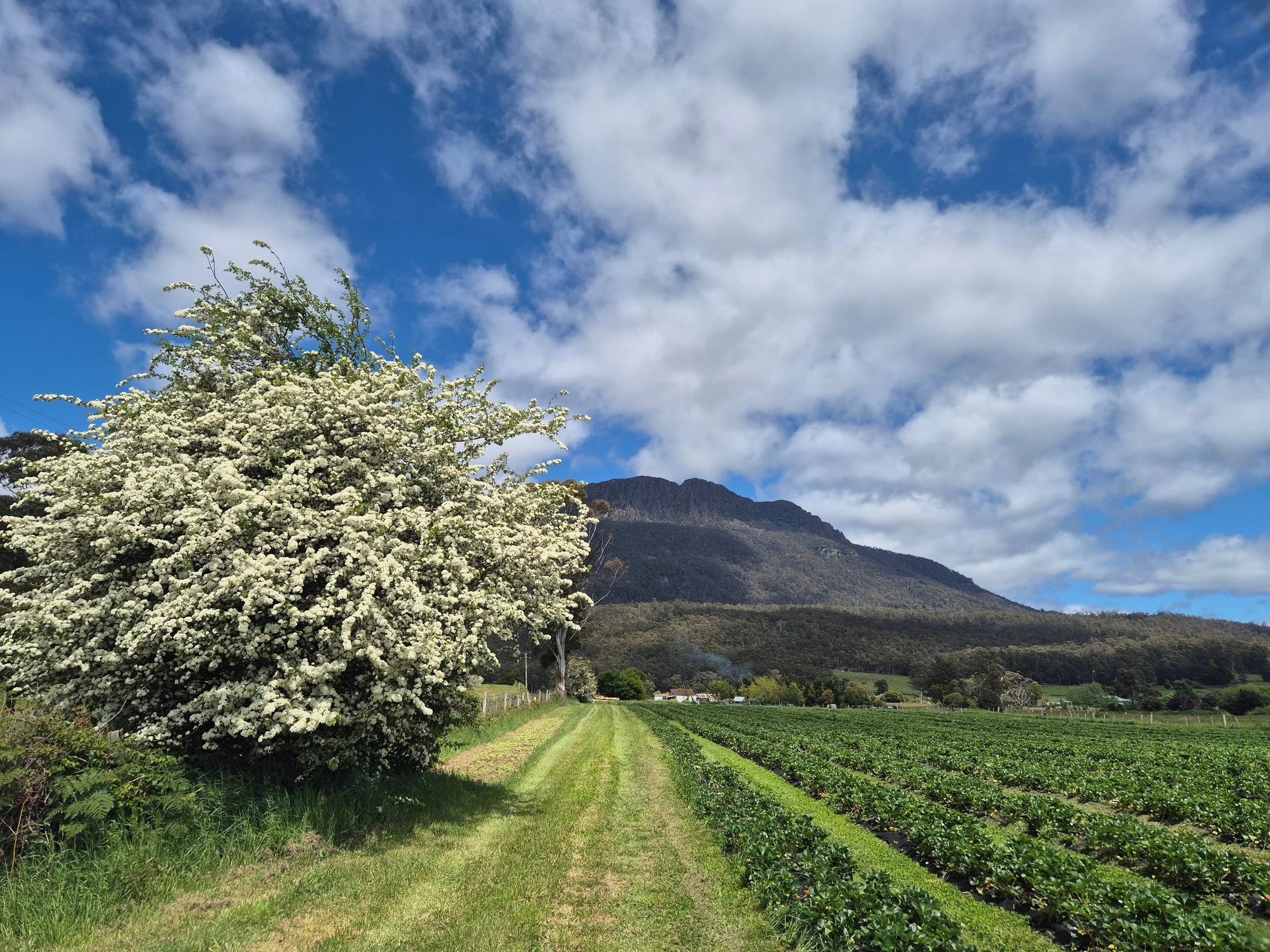
Strengthen Your Farm's Future
with a Farm Business Resilience Plan
tHIS PROJECT RAN FROM OCTOBER 2023 TO OCTOBER 2025.
If you would like further information contact RMCG at rm@rmcg.com.au
The Resilient Farming Tas Program was a strategic business coaching and planning program, focused on risk and opportunities assessments and action planning.
By developing a Farm Business Resilience Plan, you strengthened your farm’s ability to withstand, adapt and recover from challenges associated with changing conditions such as drought.
The program was designed to help Tasmanian farmers to develop a Farm Business Resilience Plan. A coach, supported by a team of subject matter experts, guided you through assessing your strengths, weaknesses, opportunities and threats, identifying priority risks, creating fit-for-purpose mitigation strategies, and equipping your business with the decision-making tools needed to act. These plans informed future actions and helped support grant and finance applications.
Farm Business Resilience Topics
-
The Farm Team
Leadership
Human Resource Management (HR)
Effective Communication
Succession Planning
Workplace Induction
Relationships with suppliers, customers and industry networks
-
Decision-making, getting good advice and using it
Insurance
Financial - Making sense of the numbers
Legal Obligations (Compliance), Planning Schemes, Environmental Obligations
Diversification, access to off farm obligations
-
Biodiversity
Waterways on farm
Climate adaptation
On-farm carbon and greenhouse gas emissions
Managing waste and resources and agriculture in the circular economy
Environmental Stewardship
First Nations Cultural Heritage
European Heritage
-
Whole farm plan / PMP / WAR
Farm Infrastructure
On Farm Safety, WH&S
Technology and Innovation (precision agriculture, including sensors and data analytics)
Biosecurity (pest, weed and disease management) and managing wildlife pial, birds, deer, etc.)
Looking after livestock (stocking rates, feed availability, animal welfare)
Irrigation and stock water (access, security)
Nutrient management knowledge (annual crops, pasture, livestock, perennial crops)
Soil (managing risks to soil health)
Frequently Asked Questions
-
The program ran from October 2023 to October 2025 and accepted the last cohort in September 2025.
The program is no longer accepting new participants.
Contact rm@rmcg.com.au if you would like further information.
-
Your Farm Business Resilience Plan laid out specific actions drafted by you, for your business. They helped inform decision-making, and prepared in advance for future challenges; climate, market pressures, biosecurity and more.
You could choose to complete ‘a plan on a page’ or a more in-depth (10-15 pages) plan, that you (and others) could refer to in both the short and long-term. You directed what you’d liked to address after completing a risk assessment informing both risks and opportunities.These might have linked to:
when to expand or diversify, or when to pivot, de-stock or sell,
what precautions or actions to take in event of a biosecurity incursion or safety incident,
what you value, or would like to prioritise, in your life and business – it could be brand recognition, a more relaxed life, a secure place to call home for you and future generations, or anything else.
Some drought assistance grants and loans are requiring a Farm Business Resilience Plan to apply, and the areas you raise as needing more support may inform future support programs.
-
The program went beyond providing information through workshops, webinars or resources, and:
Offered one-on-one coaching and support to access information but also guidance in how to use it to plan ‘ahead of the curve’.
Helped you work on your business – to understand your strengths, weaknesses, opportunities, threats and risks across people, finances, operations and landscape.
Worked with you to develop a Farm Business Resilience Plan, and gave you the action steps to overcome your unique business challenges.
Built your skills for a more secure, resilient future.
-
The program was for any Tasmanian non-corporate farm businesses registered for GST that would like to secure their future. We invited sole traders, trusts, partnerships and private companies to reach out to discuss how we were able to support them.
-
Last registrations for the program were accepted in September 2025, however you may register as an EOI to stay informed of future opportunities by emailing moraga@rmcg.com.au or call (03) 6334 1033
-
We encouraged family members and farm staff to contribute to business risk assessments and forward planning. Up to 3 members from each business were eligible to participate in the program, with a total cost to the business of $500 plus GST.
-
The Resilient Farming Tas program was significantly subsidised by the government. On average, RFT participants receive between $5,000 and $8,000 worth of expert coaching and learning opportunities, both online and in person.
Your investment supported the future of your business, and your life. Many participants have found the program helps them prioritise their time; whether spending quality time with the family, pursuing hobbies or simply enjoying peace of mind from clearing the mental ‘to-do’ list. Additionally, participants have shared that their Farm Business Resilience Plan actions will increase their business’ profitability, in both the short and long term.
-
Last registrations for the program were accepted in September 2025.
As beekeepers are primary production businesses and beekeeping may be critical for agricultural resilience, they were invited to join the RFT program.
In addition to building your own business resilience plan and skills, through the program you were able to meet farmers looking for pollination services and potential suppliers.Beekeepers registered with Biosecurity Tas and registered for GST were eligible to receive the National Varroa Mite Management Program subsidy for participation.
participant Program Journey
Also included:
Online resource portal
Access resources, tools, and tips to support your decision-making.
Workshops & Events
Attend events tailored to different industry sectors and regions, covering topics like soil health, decision making, financial budgeting and planning, workforce planning, financial strategies, emission reductions, climate adaption, and more.
Meet the experts
Delivery Team
RMCG is an Australian environmental and agricultural consulting business. The team members in this project live across Tasmania; mostly working out of Launceston and Hobart, ready to meet you anywhere.
Optimum Standard is a Tasmanian consultancy, located in Hobart, focusing on regional communities and agricultural businesses and supply chains. We work with governments, farm businesses, food processors, logistic operators, waste managers and service providers here in Tassie.
Together we also collaborate with a range of experts and specialists; Rural Business Tasmania (RBT), Rural Alive and Well (RAW), Safe Farming Tasmania, and VegNET to name a few. Our delivery team will collaborate with these organisations and other specialists to provide program participants with the input and insight they need to make a good plan.
"Having a coach or mentor outside our immediate business circle has been incredibly valuable. We've been part of the Resilient Farming program for over a year now, and I would genuinely recommend it to other farmers. The greatest benefit for us has been the opportunity to sit down with our mentor and work through the various risks our business may face. While we were often aware of these risks, we tended to overlook them or push them aside. Taking the time to confront them directly and develop a clear action plan has made a real difference. It’s helped us build a stronger, more sustainable business for the long term."
- Johannes, EcoHarvest Tasmania
Contact Us
The program ran from October 2023 to October 2025.
Interested in learning more about the program or have a question? Use the contact details below!
Phone: 03 6334 1033
Email: rm@rmcg.com.au
Funding Statement
The Farm Business Resilience Program is jointly funded through the Australian Government’s Future Drought Fund and the Tasmanian Government’s Rural Business Resilience Package.


















